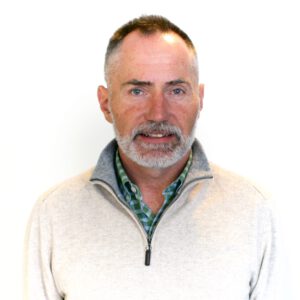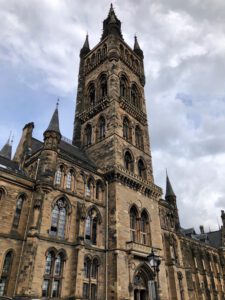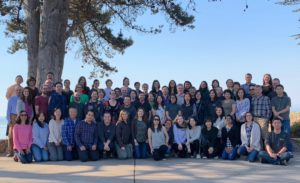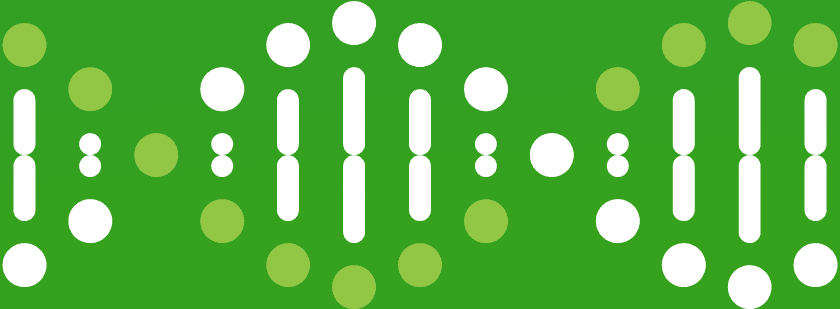
Kenneth Hillan, M.B., Ch.B. 23andMe’s Head of Therapeutics
We recently sat down with Kenneth Hillan, M.B., Ch.B. 23andMe’s Head of Therapeutics, to learn more about his journey, career, and vision for Therapeutics. Prior to coming to 23andMe Kenneth was CEO of Achaogen, Inc where he also served on the board of directors. Before that he spent 17 years at Genentech rising to the position of Senior Vice President and Head of Clinical Development and Product Development Strategy in Asia-Pacific for Roche in Shanghai, China. Originally from Scotland, Kenneth studied medicine and became a surgeon and pathologist before coming to the United States.
Tell us about your childhood.
I grew up in a pretty traditional family, for the west of Scotland, in a town called Renfrew, near Glasgow. I went to school at Glasgow University, where I studied Medicine. Student life in Scotland was a wee-bit different from what normally happens in the States. It was a great place to learn and make lasting friendships. I’ve always enjoyed the outdoors, and as a keen hiker, I probably spent more time walking the hills of Scotland than I did studying.

Glasgow University, Scotland
What did you want to be when you were a kid??
I always wanted to be a doctor, and it’s ultimately what I became, although that’s not exactly what I do now.
What eventually brought you to the US?
While you should listen to what people tell you, you shouldn’t always do what they say.
Earlier in my career, when I was thinking about coming to the States, my then boss, Roddy MacSween, said to me, “You definitely should not go to the States — you’ll be lost to British pathology.”
However, getting on a British Airways flight bound for SFO on July 31, 1994 turned out to be one of the best decisions I ever made, as it opened my mind to all of the incredible possibilities created through the emerging science of biotechnology.
I planned to spend just two years in a lab at Genentech, working on a newly discovered gene, hepatocyte growth factor, that caused the liver to grow. It’s a remarkable protein, when you give it to animals, their liver doubles in size in just three days!
So, I thought I was going to Genentech to figure out how to cure patients with liver failure using hepatocyte growth factor and eventually to return to the UK; neither of those two things came to pass.
After my first two years was over, Genentech made me an offer to join research as a scientist. So, I decided to stay, which meant giving up a career in medicine and not going back to the UK.
What was the best career advice you received?
When I was training as a doctor in Glasgow, I wanted to be a surgeon but wasn’t really sure what kind of surgery I should pursue.
So, I asked my mentor, Harry Burns, what he would do if he were in my shoes. He said, “When I was at your stage, I would have explored going someplace else to learn new surgical techniques and to travel, as you have forty years of operating ahead of you.”
Harry helped me find a place, through his network, as a surgical research fellow at the Hôpital Saint Antoine in Paris, France, which was the biggest GI surgical center in Europe.
I spent a year in Paris doing half clinical and half research. I had the chance to learn French and to meet many interesting surgeons and researchers from all over the world and also started to develop an interest in liver disease, liver regeneration, and liver cell transplantation. It eventually became the bridge that took me to Genentech ten years later.
My advice to people is to surround yourself with people who encourage and support you to do things that are a little unconventional in areas in which you have conviction.
What surprised you about 23andMe since joining?
The most surprising thing is the amount of data we have at 23andMe and our incredible data scientists who can transform that data into actionable information.
I love the fact that I can sit at my desk and ask a question in my mind, then with a click of a button, I can find out what genes might be associated with a condition or disease.
When I had lunch with Richard (Scheller, 23andMe’s Chief Scientific Officer) last November, he lured me in with data, specifically around the question, ‘are you a morning person or a night owl?’ I didn’t know the answer to what made someone a morning or night person, but Richard explained to me it had to do with the PER gene that controls circadian rhythm.
The fact you can ask our customers that question, and because of the size of the 23andMe customer database, you can find the gene that controls circadian rhythm – that blew me away! It took scientists 40 years to discover the gene that controls our body clock, and they won the Nobel prize for their work. And now at 23andMe we can find it with a click of a mouse!
What are you most excited about this year?
I joined because I’m excited about what 23andMe is doing. The ability to marry the consumer and research sides of the business, together with therapeutics, exists no place else on planet Earth. Leveraging our database and our knowledge of human genetics to select the best possible drug targets for a given disease is incredibly powerful.
We know that using genetics as a starting point in drug discovery approximately doubles the probability of creating a successful medicine, and selecting patients based on their personal genetics improves clinical outcomes. This is all part of our secret sauce and has never before been done on the scale that we are working on at 23andMe.
We have a really strong and committed Therapeutics team and are continuing to add new people and capabilities as we advance our pipeline.

23andMe’s Therapeutics team
The database continues to grow and scale, and with the GSK collaboration we continue to make new discoveries.
It’s our ability to advance a portfolio of programs at 23andMe that is so important, as even with the best science and scientists, some programs will still falter, for reasons like toxicity or an inability to create a molecule with all of the drug-like properties needed to treat patients.
23andMe has the potential to turn the future of healthcare on its head.
What is your vision for Therapeutics in the next five years?
The mission at 23andMe is all about helping people access, understand and benefit from the human genome. Therapeutics is one of the key ways we can help our customers to reach the full “benefit” from the human genome by successfully bringing targeted therapies based on human genetic data to them.
With products and patients selected based on a deep understanding of the genetic drivers of disease, we have a goal of delivering better patient outcomes and real value to the healthcare system. We are still on our way to realizing that vision and I feel extraordinarily privileged to be a part of what I know is going to be the incredible journey of getting from here to there.
Final thoughts about Therapeutics
Unlike our consumer business where we improve and refine our product every year and can react and respond to marketing data on a real time basis, in Therapeutics, it’s very different, it is a longer journey.
While the return on all of the work is potentially enormous, it occurs over five, six, or seven years. We need to understand that it takes time and while I wish we could move more quickly, we’re making real progress, and I’m confident it will be worthwhile.




